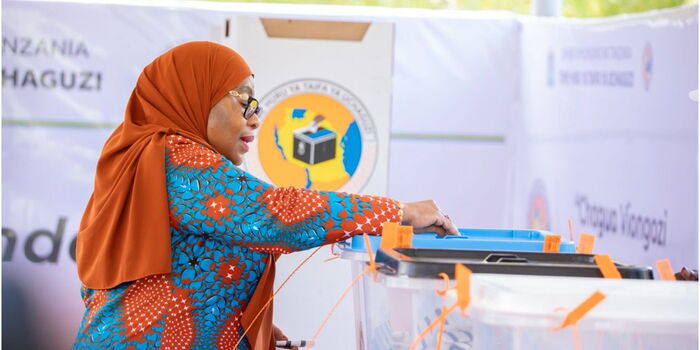Samia Suluhu Hassan has officially been declared the President-elect of Tanzania after securing an overwhelming victory in the recently concluded national elections.
According to the results announced by the Tanzanian Electoral Commission on Saturday, November 1, Suluhu received a remarkable 31.9 million votes, which represents 97.66 percent of all the votes cast.
This landslide victory firmly cements her position as one of the most dominant political figures in the country’s history.
Her closest competitor, identified as Chaumu, managed to garner only 213,414 votes, which translates to about 0.65 percent of the total ballots cast. The electoral body further reported that over 37 million Tanzanians were registered to vote in this election.
The results were made public three days after the voting exercise concluded on Wednesday, October 29. Reports indicate that the official swearing-in ceremony for President-elect Suluhu is expected to take place later today.
Interestingly, she has maintained a relatively low profile since election day, making only limited public appearances as the nation awaited the official outcome.
Post-Election Tensions and Protests
Despite the announcement of the results, widespread unrest has been reported across several regions in Tanzania. Protesters have taken to the streets, accusing the government of interfering with the democratic process and suppressing opposition voices.
The country’s main opposition candidate, Tundu Lissu, was reportedly detained before and during the election period, while another prominent opposition figure was disqualified from participating in the polls.
These developments have sparked outrage among citizens who believe the elections were neither fair nor transparent.
Since Wednesday, violent clashes between police and demonstrators have erupted in various parts of the country. Security forces have been seen using tear gas to disperse angry crowds demanding justice and accountability.
Gunfire was reportedly heard in the northern city of Mwanza, while similar confrontations occurred in Dodoma, the nation’s capital.
In Dar es Salaam, the country’s largest city, major roads have been blocked, and heavy security presence has been maintained to curb the growing tension.
In response to the escalating chaos, the government has imposed a dusk-to-dawn curfew in Dar es Salaam. Regional Commissioner Alfred Chalamila issued a stern warning, saying that authorities will not tolerate any attempts to destabilize the peace or interfere with the election process.
Despite these warnings, several polling stations were vandalized by angry youth who tore down ballot boxes in protest against what they described as a rigged election.
Adding to the growing unease, reports have surfaced of a government-imposed internet and communications blackout that began on election day.
Many citizens and journalists have condemned the move, saying it violates freedom of expression and raises concerns about state-led censorship.
Suluhu’s Political Journey
Samia Suluhu, who ran on the ticket of the ruling Chama Cha Mapinduzi (CCM) party, was seeking her first direct mandate from Tanzanians as president.
She initially rose to power in 2021 after the death of former President John Pombe Magufuli, whom she served as vice president.
Her victory marks a historic moment as she continues to solidify her place as Tanzania’s first female head of state.
Supporters of the ruling party have hailed her triumph as a testament to her leadership and experience, while critics argue that the election was marred by intimidation and lack of transparency.
As the country awaits her official swearing-in, many Tanzanians are watching closely to see how President Suluhu will handle the political unrest and whether she will take steps toward promoting national unity, reconciliation, and democratic reforms.
Join Government Official WhatsApp Channel To Stay Updated On time
https://whatsapp.com/channel/0029VaWT5gSGufImU8R0DO30


